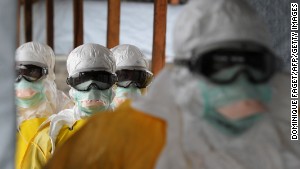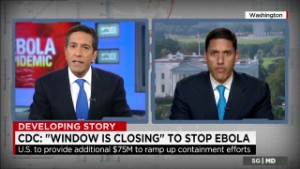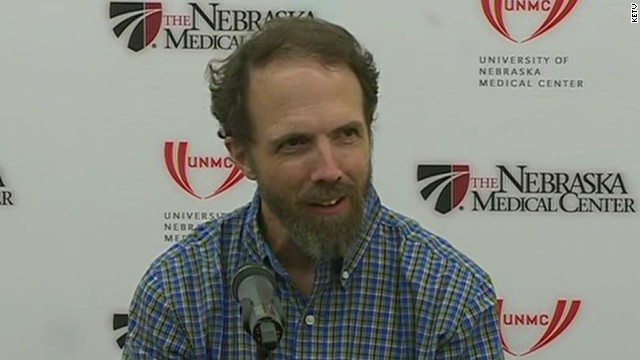http://edition.cnn.com/2014/09/25/health/ebola-american-patient/index.html?hpt=iaf_c2
American Ebola patient released from Nebraska hospital
September 25, 2014 -- Updated 1654 GMT (0054 HKT)
STORY HIGHLIGHTS
- Dr. Rick Sacra, an American Ebola patient in Nebraska, is released from a medical center
- Sacra received plasma from a survivor and an experimental drug
- He has been declared free of the Ebola virus
(CNN) -- Dr. Rick Sacra, who entered The Nebraska Medical Center three weeks ago with Ebola, was released Thursday.
"The CDC has declared me safe and free of the virus," Sacra said at a news conference. "Thank God, I love you all!"
Sacra joked about now being a lifetime Huskers fan as he thanked his medical team, the biocontainment unit team and his friend, Dr. Kent Brantly.
Sacra and Brantly were infected with Ebola while working in Liberia with the aid organization Serving in Mission. Sacra was treating patients in an obstetrics clinic in Monrovia and was not working directly with Ebola patients. He said that he does not know how he became infected with the virus but that it's possible one of the women he helped had the disease.




Brantly, who tested negative for the deadly virus after receiving treatment in Atlanta, flew to Nebraska where Sacra was in isolation and donated his blood two weeks ago. Doctors believe Brantly's plasma had antibodies that Sacra needed to help his immune system fight the deadly virus.
The Nebraska Medical Center owns one of just a fewbiocontainment units that exist in the United States.
"I did say, wow, Nebraska? Who made that decision?" Sacra joked. "Once I heard about (the biocontainment unit) I was like cool, I've never been to Nebraska."
In addition to the blood transfusion, doctors gave Sacra aggressive supportive care, including electrolytes and IV fluids. The Nebraska doctors also gave Sacra an experimental drug called TKM-Ebola, which the FDArecently approved for wider use.
Sacra locked himself in his room for three days when he first came down with a fever in Liberia on August 29. A mobile CDC lab confirmed he had the disease on the third day, and by the sixth he was flying home to the United States.
"I never felt like I was not going to make it," he said. "The care was so excellent, so speedy, so prompt, that I'm just thanking God for that."
Sacra says he is now feeling good, though he's still very weak. He was up to five minutes on a stationary bike he had in his hospital room before being released, but even that tired him out.
Sacra has done missionary health work for the past 25 years. He had flown to Monrovia in August after learning his colleagues from Serving in Mission had gotten sick. Sacra worried that Ebola would cause a "domino effect" on the already vulnerable Liberian health care system and that people with common ailments wouldn't get help.
When Sacra arrived in Monrovia, that's exactly what he found. His wife, Debbie, has said there wasn't a single pair of latex gloves to buy in the entire city. Without protective equipment, medical clinics shut down. She says Sacra drove from hardware store to hardware store, looking for boots to protect his staff.
When he was finally able to open the clinic, for some it was too late. She says dozens of pregnant women who needed Cesarean sections turned up at the clinic after having failed to find help anywhere else in the city.
By the time these women arrived at Sacra's clinic "only the mothers' lives could be saved," Debbie Sacra said.
At the news conference, Rick Sacra thanked everyone around the world who had prayed for him during his time of need and asked for more prayers and practical health for the people of West Africa. "The Ebola crisis continues to spin out of control," he said.
He and his wife will return home soon, where Sacra said he hopes to take his dog for a long walk. He knows his recovery will move slowly, as Brantly told him to "be patient." But he is not ruling out an eventual return to Liberia, the country he called his second home.

沒有留言:
張貼留言